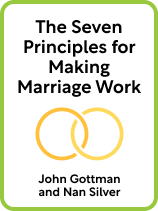

This article is an excerpt from the Shortform book guide to "The Seven Principles for Making Marriage Work" by John Gottman and Nan Silver. Shortform has the world's best summaries and analyses of books you should be reading.
Like this article? Sign up for a free trial here.
What are the most common marital problems? How do you address an ongoing problem in a marriage?
While every marriage is unique, there are several problems almost all married couples have in common. Most of these problems are solvable, but many couples drag them on for too long, making them a bigger deal than they have to be.
Here’s a look at some of the most common marriage problems and potential solutions for each.
Strategies for Common Solvable Problems
In their book The Seven Principles for Making Marriage Work, John Gottman and Nan Silver suggest several strategies for dealing with some of the most common marriage problems: issues surrounding household chores, parenting, and sex.
Household Chores. Gottman and Silver argue that solving issues around household chores will help you both feel as though you’re on the same side. In contrast, if one spouse (usually the wife) feels as though she’s taking on too much housework, she’ll feel like she’s in an inequitable marriage. This sense is often exacerbated by the reality that men often think they’re doing more housework than they are.
To more equally divide domestic labor, Gottman and Silver suggest that you first create an itemized list of every household chore you each do—such as clearing the table. Second, agree to split the responsibilities in a way that you both agree is fair. Third, do your assigned chores—without being reminded by your spouse. That said, be open to taking on more work occasionally; for example, if your spouse is especially busy at work, clear the table even when it’s not your turn.
| How to Split Household Chores More Fairly Experts suggest that women feel as though they’re doing more housework than men not just because it’s true, but also because they take on more “mental load,” which means they spend more time thinking about domestic tasks—like purchasing a birthday gift for their in-laws. To more equally divide domestic labor, experts suggest that you first re-evaluate whether a chore needs to be done. Then, after creating an itemized list of responsibilities and splitting them fairly, agree on what it means for a particular chore to be “done.” For example, does clearing the table mean removing the dishes, or does it mean removing the dishes and wiping down the table? The more clearly you define each task, the less likely you are to fight about it in the future. Finally, be flexible. Keep in mind that the point of equally dividing domestic labor is not to do exactly equal amounts of work every day but to equally value each other’s time so that one person isn’t constantly picking up after the other. |
Parenting. Gottman and Silver explain that how you handle having your first baby can be a critical turning point in your marriage. When a woman becomes a mother, her sense of identity dramatically transforms to encompass her new role; she is now part of a “we” that includes her and her child. Consequently, the husband starts to feel left out, and the health of the marriage suffers.
The solution, according to Gottman and Silver, is to include the husband in the process; both husband and wife should transform together into parents. Wives can encourage this process by letting the husband parent. Wives often correct new fathers’ parenting skills. But constant criticism leads the father to doubt his parenting skills and become increasingly less involved (which makes him feel left out and ultimately damages the marriage). So the wife must allow her husband to parent in his own way—without commenting negatively on his skills.
(Shortform note: Some experts suggest that the decrease in marital satisfaction caused by having a baby stems not from the father’s feelings of isolation but from the mother’s exhaustion. She takes on more nighttime childcare work and does more domestic labor, so she starts to feel that the partnership is inequitable. New mothers can mitigate this exhaustion by letting the husband parent without butting in, as Gottman and Silver describe. Experts say that mothers who struggle to let their husband parent should leave their spouse alone with the baby, such as by going to a friend’s house.)
Sex. Gottman and Silver suggest that sex often falls by the wayside in a marriage because couples struggle to communicate their desires to each other. Therefore, if you want to improve your sex life, you must learn to communicate about sex.
Gottman and Silver suggest several strategies for making conversations about sex easier. First, be kind. Remember that the point is to improve your sex life, not to make your partner feel bad about whatever they’re doing. Second, develop rituals around asking for sex. Having a standardized way of asking will help you feel less vulnerable. For example, kissing your partner’s neck might indicate that you want sex; your partner might respond enthusiastically when interested but turn their head when uninterested. Third, be considerate when refusing or when you’re being refused. If you’re the one refusing, express that you’re still attracted to your partner. If you’re being refused, receive your partner’s decision without negative comment.

———End of Preview———
Like what you just read? Read the rest of the world's best book summary and analysis of John Gottman and Nan Silver's "The Seven Principles for Making Marriage Work" at Shortform.
Here's what you'll find in our full The Seven Principles for Making Marriage Work summary:
- Why becoming genuine friends with your spouse is essential
- Four principles for improving your marital friendship
- The three warning signs that your marriage is in trouble






